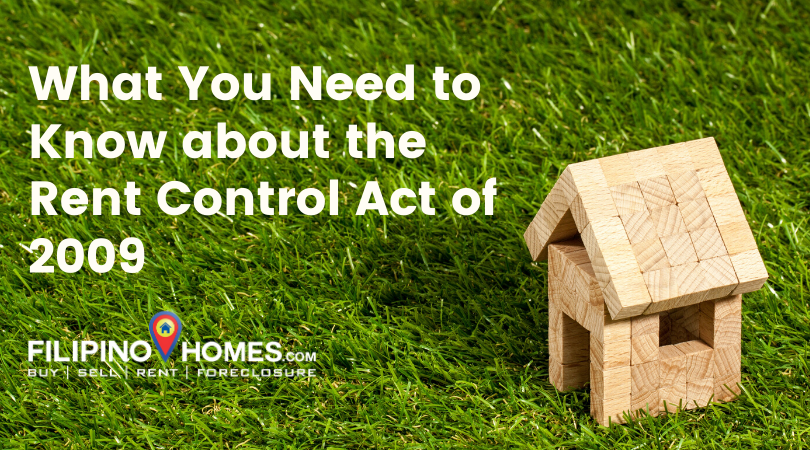Whether you are a landlord or a tenant, it may be time to brush up on your knowledge of the Rent Control Act to better understand your rights and responsibilities. This act covers housing rentals in the country, protecting renters from sudden increases in rental rates.

What is Rent Control Act?
Republic Act No 9653 or “An Act Establishing Reforms in the Regulation of Rent of Certain Residential Units, Providing the Mechanisms Therefore and For Other Purposes” also known as “The Rent Control Act” aims to protect housing tenants in the lower-income brackets and other beneficiaries from unreasonable rent increases. It was approved in 2009; expired on December 31, 2013, but has been extended by the Housing and Urban Development Coordinating Council (HUDCC), the government agency tasked to oversee the law’s implementation, until December 31, 2020.
Coverage of this Act
RA 9653 covers the following residential units nationwide, whose monthly rent is up to P10,000 and below:
- Apartments;
- Houses and/or land on which another’s dwelling is located and used for residential purposes; and
- Buildings or parts thereof, which are being used solely as dwelling units, boarding houses, dormitories, rooms and bed spaces.
Rent-to-own units, commercial spaces, motels, and hotels are not covered.
Advances and Deposits
According to the Rent Control Act, it is illegal for landlords to demand more than one (1) month advance rent or more than two (2) months deposit. The law also requires lessors to deposit the amount of the 2-month deposit in a bank account under the landlord’s name, with all accrued and accumulated interest to be returned to the tenant, along with the deposit, at the expiration of the rental contract.
This amount will be forfeited, however, in the event that the tenant fails to settle rent or utility bills. The amount can also be used for repair of damages and replacement of any component of the rented unit.
Subleasing Guidelines

The act addresses issues on subleasing. A tenant is not permitted to sub-lease the unit without prior written consent from the landlord. Doing such may be used as a reasonable ground to evict the tenant from the rented unit.
Maximum Rent Increase
The increase in the monthly rental rate of any residential unit shall not be more than:
- Four percent (4%) annually for residential units with a monthly rent of below P4,000; and
- Seven percent (7%) for units with a monthly rent of P4,000.00 up to P10,000.00 for as long as the unit is occupied by the same lessee.
Rental accommodations offered to students such as boarding houses, dormitories, rooms, and bed spaces are only allowed to increase rents once a year, even if a new renter occupies the unit within the same year.
Grounds for Evicting Tenants
The landlord has the right to eject the tenant on the following grounds:
- The lessee assigns the lease or sub-leases the unit, without the written consent of the owner/lessor;
- The renter has accumulated arrears in rental equivalent to three (3) months;
- After the expiration of the lease period, the lessor/owner has a legitimate need to repossess the property for his/her own use or that of his/her family as a residential unit, provided that the renter was notified three months in advance;
- The lessor/owner needs to make necessary repairs on the leased premises which is the subject of an existing order of condemnation by appropriate authorities concerned in order to make the premises safe and habitable; and
- The lease contract has expired.
The lessee cannot be ejected on the ground that the leased premises have been sold or mortgaged to a third person regardless of whether the lease or mortgage is registered or not.
Penalties for Violators of the Rent Control Act
Violators of the act face a fine of not less P25,000 but not more than P50,000 or imprisonment of one (1) month and one (1) day up to(6) months, or both.
References
You can read the full version/copy of the original signed Act below:
FAQ on the Extension of Rent Control Act here: http://www.hudcc.gov.ph/QandA




